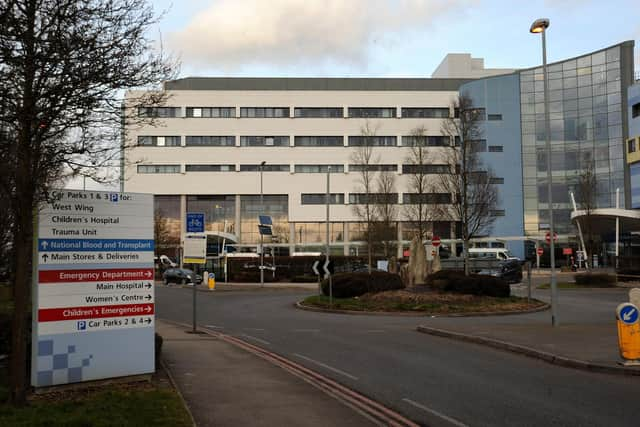'Breakthrough' heart procedure at the JR Hospital, Oxford gives hope for patients with severe valve disease
and live on Freeview channel 276
The operation – performed at the end of last year - could provide huge relief to patients with disorders of a valve which controls the flow of blood, causing such symptoms as fluid retention and breathlessness. And patients could leave hospital within a couple of days. Dozens of patients are expected to be treated each year.
Transcatheter Tricuspid Valve Replacement (TTVR) procedures took place at the Oxford Heart Centre, based at the John Radcliffe Hospital, in December to treat two patients with severe tricuspid regurgitation.
Advertisement
Advertisement
Tricuspid regurgitation is a disorder in which the tricuspid valve, which controls the flow of blood from the heart's right atrium (top chamber) to the right ventricle (bottom chamber), does not close properly.


Patients with this condition can suffer a very poor quality of life and it can be life-threatening. Options for treating it have been very limited as open heart surgery is often prohibitively high risk and there are no effective drug treatments.
However, in a UK first, Oxford University Hospitals NHS Trust (OUH) has carried out the new, minimally invasive procedure, which has the potential to transform the care of these patients. The technology used is the first and only approved technology able to fully replace the tricuspid valve via transcatheter manner.
The leaky tricuspid valve is replaced with a new valve that can be delivered via a leg vein under a light anaesthetic, avoiding the need for open heart surgery. Patients do not need to spend time on an intensive care unit and should be able to leave hospital within a couple of days.
Advertisement
Advertisement
The therapy supports patients who previously had no treatment options, providing significant improvements in their quality-of-life.
Sam Dawkins, a Consultant Interventional Cardiologist at OUH who led on the procedure, said: “To carry out the first two procedures has been a huge step forward to provide meaningful treatment to this patient group.
“We are really excited to offer this technology safely, especially to people who have very few options and experience debilitating symptoms. It really is a breakthrough for them.
“We have been building up to this procedure for a long time and it has been a real team effort, including the hard work of both medical and non-medical colleagues.
Advertisement
Advertisement
“It was enjoyable for me as the operator seeing everyone pull together to make this happen. We have an enormous number of talented people here and I feel very privileged to work with them.”
He added: “We are very thankful to Edwards Lifesciences for helping us with this pioneering breakthrough treatment for patients suffering from tricuspid regurgitation, and to Oxford Hospitals Charity for funding much of the high tech equipment in our laboratory. Working in partnership has been instrumental in making TTVR at OUH a possibility.”
Dr Andrew Brent, Chief Medical Officer at OUH, said: “We are delighted that we have been able to help these patients. It is our vision to provide the best care possible underpinned by high quality research and innovation, so we and very proud of the cardiology team who have delivered this UK first.”
Rosalind Walsh, 79 from Cheltenham, was diagnosed with tricuspid regurgitation in November 2023 following a period of illness that made her feel “absolutely terrible” and for which she required hospital care. The mother-of-two and grandmother-of-three was struggling to breathe, which was caused by a leaking valve in her heart.
Advertisement
Advertisement
Rosalind was invited to have a TTVR in Oxford and had the operation in December 2023.
She said: “I feel privileged to have undergone TTVR, which has been a miracle for me. I initially felt very tired after the operation, but I am feeling stronger and more like my old self again.
“Prior to the procedure, I felt very worried that my health problems would never go away. I was losing hope. However, I can now take on more challenges, and I am able to see a positive way forward and a much brighter future for me ahead. I think TTVR will give hope to people like me.
“I can’t praise the staff highly enough. They were very caring and kind and, although I had the expected nerves before the operation, it was very quick and I feel very happy now.”
Advertisement
Advertisement
Oxford Hospitals Charity funded over £800,000 of high tech equipment for the Oxford Heart Centre’s Cardiac Catheterisation Laboratory – or ‘Cath Labs’ – where this procedure took place. This included the very latest ultrasound equipment, which provided very high quality imaging needed to undertake this innovative procedure.
Douglas Graham, Chief Executive Officer at Oxford Hospitals Charity, said: “We are absolutely thrilled that the equipment funded thanks to the very generous support of our ‘Heartfelt Appeal’ has helped Sam and the talented team take this huge step forward.
“It is wonderful to hear of the hope this breakthrough will give so many patients who, thanks to this new procedure, can look forward to a significantly more positive future.”
Nick Walker, Senior Country Director at Edwards Lifesciences UK and Ireland, said: “Innovating for patients with unmet needs is at the centre of everything we do at Edwards Lifesciences, which makes us especially proud to have pioneered this first-of-its-kind transcatheter tricuspid valve replacement therapy.”
Advertisement
Advertisement
The Trust supports world-leading research programmes in cardiovascular diseases, musculoskeletal disorders, neurological disorders such as Parkinson’s and Alzheimer’s through its designation as one of the UK’s five comprehensive biomedical centres.
It works in close partnership with the University of Oxford and is a leading centre for cancer, neurosciences, diabetes, genetics and many other fields. Research themes of particular strength are: cancer, cardiovascular science, diabetes, endocrinology and metabolism, infection and immunology, musculoskeletal science, neuroscience and reproduction and development.